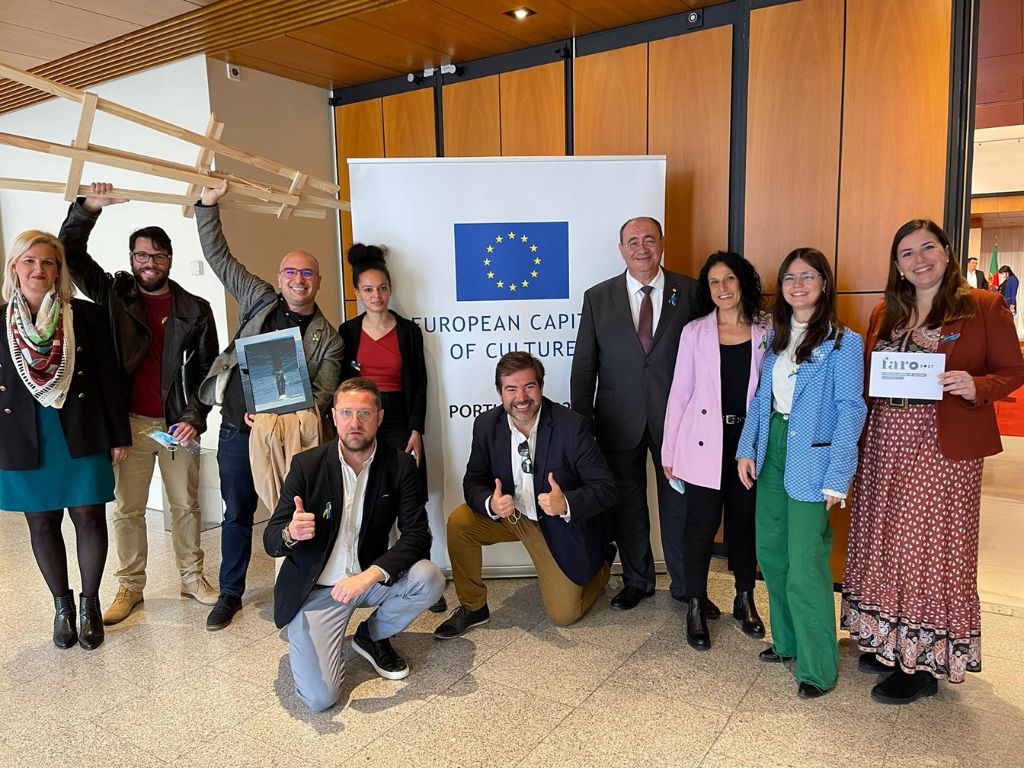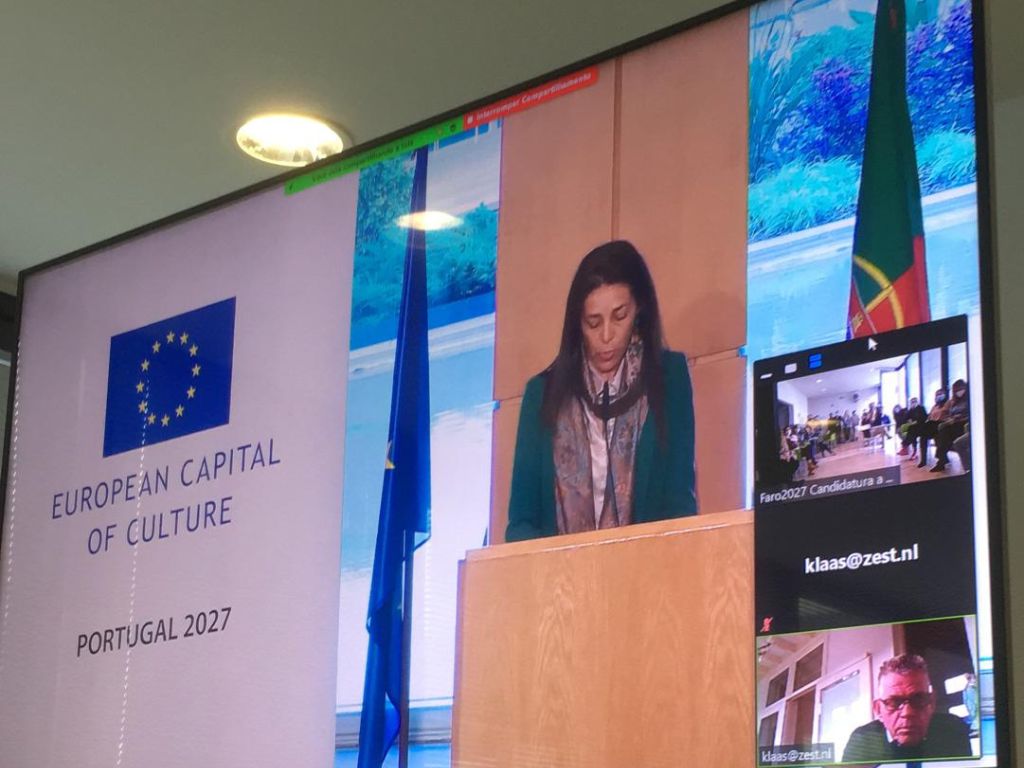|
European Capital of Culture is the most recognised project in the European Union. This is a complex process that does not end with a city's cultural program for a year.
Faro was Candidate for European Capital of Culture 2027. Unfortunately, it was not one of the selected cities to make it to the finals. We believe that this process has brought new life to the city and the region, boosting cultural, social and economic development. We are proud to present our Candidacy Dossier (Bidbook) and a document with comments for the jury to appreciate. .The main objective is to put cities at the centre of cultural life across Europe. In this way, we show what we have in common but also the richness of our diversity of traditions, languages, history... Being the European Capital of Culture is bringing new life to the city and the region, boosting cultural, social and economic development. Want to know how? We explain below. |
What is a European Capital of Culture?
|
European Capital of Culture is the most recognized project in the European Union. This is a complex process that is not limited to the cultural program of a city for a year.
The main objective is to place cities at the center of cultural life across Europe. In this way, we show what we have in common but also the richness of our diversity of traditions, languages, history… |
WHAT ARE THE MAIN BENEFITS OF BEING A EUROPEAN CAPITAL OF CULTURE?
The project aims to ensure that the initiative, structures and capacities created within the European Capital of Culture scheme be used as the basis for a sustainable cultural development strategy in the cities in question, ensuring the following long-term effects are achieved:
- Cities are regenerated
- The international profile of cities is raised
- New life is breathed into a city's culture
- Tourism is boosted
- The cultural, social and economic development of the region surrounding a city is influenced
WHAT ARE THE GENERAL OBJECTIVES OF A EUROPEAN CAPITAL OF CULTURE?
- To safeguard and promote the diversity of cultures within Europe and highlight the characteristics they share, as well as increasing citizens' sense of belonging to a common cultural area;
- Foster the contribution of culture to the long-term development of cities in accordance with their respective strategies and priorities.
WHAT ARE THE SPECIFIC OBJECTIVES OF A EUROPEAN CAPITAL OF CULTURE?
- Strengthen the reach, diversity and Europe-wide dimension of cultural life in cities, specifically through transnational cooperation;
- Extend access to and participation in culture;
- Strengthen the capacity of the cultural sector and its links to other sectors;
- Improve the international profile of cities through culture.
DOES THE EUROPEAN UNION MAKE A FINANCIAL CONTRIBUTION TO THE "EUROPEAN CAPITAL OF CULTURE"?
Up until 2009, this funding, of around 1.5 million euros per European capital, was allocated through the Culture programme [https://ec.europa.eu/culture/], to specific projects. This programme would also fund projects run by event promoters.
From 2010 onwards, European Cities of Culture were awarded a prize instead of a subsidy. This award, which honours Melina Mercouri, is awarded no later than three months before events begin, provided that the city fulfils all commitments made in the application process, respects the criteria and takes into account the recommendations provided in the selection and monitoring reports.
The commitments made in the application phase are considered to have been met by the designated city if no substantial change has been made to the programme or strategy between the application phase and the year for which the title is awarded, specifically:
From 2010 onwards, European Cities of Culture were awarded a prize instead of a subsidy. This award, which honours Melina Mercouri, is awarded no later than three months before events begin, provided that the city fulfils all commitments made in the application process, respects the criteria and takes into account the recommendations provided in the selection and monitoring reports.
The commitments made in the application phase are considered to have been met by the designated city if no substantial change has been made to the programme or strategy between the application phase and the year for which the title is awarded, specifically:
- The budget has been maintained at a level capable of offering a high quality cultural programme that meets the criteria stated;
- The independence of the artistic team has been duly respected;
- The European dimension carried enough weight in the final version of the cultural programme;
- The marketing and communication strategy and all communication materials used by the city clearly reflect the fact that the this is an EU scheme;
- Plans for monitoring and assessing the title's impact on the city awarded have been established.
- How is the application processed?
How is the application processed?
WHAT IS INVOLVED IN AN APPLICATION?
The application must be based on a cultural project with a European dimension, which has cultural cooperation as its main focus.Each city will put together a programme of cultural events that values its own culture and cultural heritage, as well as its position in our shared cultural heritage, involving cultural agents from other European countries as a means through which to establish lasting cooperation.
The programmes designed by cities awarded the title in the same year must relate to each other.
The application process must specifically detail how the city applying intends to:
The programmes designed by cities awarded the title in the same year must relate to each other.
The application process must specifically detail how the city applying intends to:
- value artistic currents and styles shared by Europeans inspired by their own culture or to which they have significantly contributed;
- hold events that involve cultural agents from cities in other European countries, therefore leading to long-term cultural cooperation and encouraging them to circulate within the European Union;
- support and develop creation, an essential element of any cultural policy;
- ensure large sections of the population are mobilized and participate in events, therefore securing the social impact of the programme and that its values are continued beyond the year in question;
- welcome all EU citizens and encourage information about all events planned to be shared as widely as possible, using all multimedia resources available;
- encourage a dialogue between European cultures and other world cultures and, in that spirit, value the openness and understanding of others as fundamental cultural values;
- explore the city’s historical and architectural urban heritage, as well as quality of life in the city.
WHY 2027?
As per Decision No. 445/2014/EU of 16th April 2014 of the European Parliament and the Council of the European Union, a Union action was created to support the European Capitals of Culture for the years 2020 to 2033, indicating that Portugal, along with Latvia, would be granted the European Capital of Culture title in 2027.
HOW MANY CITIES HAVE BEEN AWARDED THE TITLE OF EUROPEAN CAPITAL OF CULTURE?
Since Athens was named the first ever European Capital of Culture 1985, to Plovdiv (Bulgaria) and Matera (Italy), which were the winners in 2019, 60 cities have been awarded the title.
The cities are already designated European Capitals of Culture between now and 2023 are as follows:
The cities are already designated European Capitals of Culture between now and 2023 are as follows:
- 2020
- 2021
- 2022
- 2023
- Veszprém (Hungary)
HAS PORTUGAL EVER BEEN AWARDED THE TITLE?
Portugal is proud to have had 3 cities win the title of European Capital of Culture:
1994 - Lisbon
2001 - Porto (Portugal)
2012 - Guimarães (Portugal)
1994 - Lisbon
2001 - Porto (Portugal)
2012 - Guimarães (Portugal)
WHEN SHOULD A CITY START WORKING ON ITS APPLICATION?
The formal notice is published about 6 years before the year in which the city will receive the award. This gives the cities applying at least ten months to submit their proposals.
Experience has shown that successful ECOCs start preparations 2-3 years before the call is published. Here in Portugal, we’re expecting the call for applications in 2021
Experience has shown that successful ECOCs start preparations 2-3 years before the call is published. Here in Portugal, we’re expecting the call for applications in 2021
Fun Facts
WHERE DID THE NAME "EUROPEAN CAPITAL OF CULTURE" COME FROM?
Originally named the European City of Culture, this European project started in 1985 under the guidance of Greek minister Melina Mercouri. Initially, only one city was nominated per year, and it was the responsibility of the Member State in which the city was located to organise the event. Each year a new country would be selected, in alphabetical order.
In 1990, the European Union Council of Ministers decided to extend the initiative to European countries that were not part of the EU. This rule would only be applied from 1996 onwards, and was limited to countries that, according to the European Community, respected the principles of democracy, pluralism and the rule of law. As per to the new rules, it was suggested that the title be awarded alternately to members of the EU and non-members, as well as between capital cities and provincial cities. On the 25th May 1999, the Council of Ministers and the European Parliament decided to change the name from European City of Culture to European Capital of Culture.
In 1990, the European Union Council of Ministers decided to extend the initiative to European countries that were not part of the EU. This rule would only be applied from 1996 onwards, and was limited to countries that, according to the European Community, respected the principles of democracy, pluralism and the rule of law. As per to the new rules, it was suggested that the title be awarded alternately to members of the EU and non-members, as well as between capital cities and provincial cities. On the 25th May 1999, the Council of Ministers and the European Parliament decided to change the name from European City of Culture to European Capital of Culture.
WHO IS MELINA MERCOURI?
Maria Amalia Mercouri, better known as Melina Mercouri, was a Greek actress, singer and political activist. She was part of the Hellenic Parliament and, in 1981, was the first woman appointed Minister of Culture in Greece. One of her greatest achievements was establishing the institution of the European Capital of Culture, with Athens being named the first capital in 1985. The initiative came about as the result of a meeting held by Mercouri with the Ministers of Culture of all ten EU Member States at the time, during the first Greek presidency of the Council, in 1983. At the meeting, Mercouri pointed out that the Treaty of Rome, which brought about the creation of the European Economic Community (what is now the EU), made no reference to cultural questions, therefore urging the other ministers to endorse her efforts to strengthen cultural awareness throughout Europe.
The meeting would be the first in a series of periodic meetings between EU ministers of culture, which are still held to this day.
More information at: https://european-union.europa.eu/principles-countries-history/history-eu/eu-pioneers/melina-mercouri_en
The meeting would be the first in a series of periodic meetings between EU ministers of culture, which are still held to this day.
More information at: https://european-union.europa.eu/principles-countries-history/history-eu/eu-pioneers/melina-mercouri_en
How a European Capital of Culture is selected
HOW ARE EUROPEAN CAPITALS OF CULTURE CHOSEN?
The European Capital of Culture is a title awarded annually by the European Commission to two cities in Europe, in two different countries. However, every three years the title is awarded to a country/city outside Europe, as will be the case in 2024.
The title is awarded on a rotational basis. Each year the title is awarded to cities in two different countries;
A Portuguese city will win the title in 2027;
The title is awarded 6 years previously, following applications submitted by various cities in the same country. The winning city is chosen by a jury, which is a panel of cultural experts that works alongside the European Commission.
Although applications have to be submitted by a city, the area covered may also include surrounding areas, encompassing regions.
The title is awarded on a rotational basis. Each year the title is awarded to cities in two different countries;
A Portuguese city will win the title in 2027;
The title is awarded 6 years previously, following applications submitted by various cities in the same country. The winning city is chosen by a jury, which is a panel of cultural experts that works alongside the European Commission.
Although applications have to be submitted by a city, the area covered may also include surrounding areas, encompassing regions.
HOW ARE COUNTRIES SELECTED TO RECEIVE THE TITLE?
The European Commission convenes an annual jury that draws up a report about applications submitted, assessing whether they meet the objectives and characteristics of the "European Capital of Culture" initiative.
The jury is made up of 7 senior independent individuals who specialise in the cultural sector, of which two will be appointed by the European Parliament, two by the Council, two by the Commission and one by the European Committee of the Regions. The jury draws up a report which it delivers to the European Commission, the European Parliament and the Council.
The jury is made up of 7 senior independent individuals who specialise in the cultural sector, of which two will be appointed by the European Parliament, two by the Council, two by the Commission and one by the European Committee of the Regions. The jury draws up a report which it delivers to the European Commission, the European Parliament and the Council.
HOW ARE THE CITIES CHOSEN?
The European Commission convenes an annual jury that draws up a report about the applications submitted, addressing whether they meet the objectives and characteristics of the "European Capital of Culture" initiative.
The jury is made up of 7 senior independent individuals who specialise in the cultural sector, of which two will be appointed by the European Parliament, two by the Council, two by the Commission and one by the European Committee of the Regions. The jury draws up a report which it delivers to the European Commission, the European Parliament and the Council.
The jury is made up of 7 senior independent individuals who specialise in the cultural sector, of which two will be appointed by the European Parliament, two by the Council, two by the Commission and one by the European Committee of the Regions. The jury draws up a report which it delivers to the European Commission, the European Parliament and the Council.
WHAT CRITERIA ARE THEY MEASURED AGAINST?
The application evaluation criteria ("criteria") are divided into the categories "contribution to the long-term strategy", "European dimension", "cultural and artistic content", "capacity to deliver”, “outreach” and "management" as follows:
1) As regards the ‘contribution to the long-term strategy’ category, the following factors shall be taken into account:
a) That a cultural strategy for the candidate city, which covers the action and includes plans for sustaining the cultural activities beyond the year of the title, is in place at the time of its application;
b) The plans to strengthen the capacity of the cultural and creative sectors, including developing long-term links between the cultural, economic and social sectors in the candidate city;
c) The envisaged long-term cultural, social and economic impact, including urban development, that the title would have on the candidate city;
d) The plans for monitoring and evaluating the impact of the title on the candidate city and for disseminating the results of the evaluation;
2) As regards the ‘European dimension’ category, the following factors shall be assessed:
a) The scope and quality of activities promoting the cultural diversity of Europe, intercultural dialogue and greater mutual understanding between European citizens;
b) The scope and quality of activities highlighting the common aspects of European cultures, heritage and history, as well as European integration and current European themes;
c) The scope and quality of activities featuring European artists, cooperation with operators or cities in different countries, including, where appropriate, cities holding the title, and transnational partnerships;
d) The strategy to attract the interest of a broad European and international public;
3) As regards the ‘cultural and artistic content’ category, the following factors shall be assessed:
a) A clear and coherent artistic vision and strategy for the cultural programme;
b) The involvement of local artists and cultural organisations in the conception and implementation of the cultural programme;
c) The range and diversity of the activities proposed and their overall artistic quality;
d) The capacity to combine local cultural heritage and traditional art forms with new, innovative and experimental cultural expressions;
4) As regards the ‘capacity to deliver’ category, the candidate cities shall demonstrate that:
a) The application has broad and strong political support and a sustainable commitment from the local, regional and national authorities;
b) The candidate city has or will have an adequate and viable infrastructure to hold the title;
5) As regards the ‘outreach’ category, the following factors shall be assessed:
a) The involvement of the local population and civil society in the preparation of the application and the implementation of the action;
b) The creation of new and sustainable opportunities for a wide range of citizens to attend or participate in cultural activities, in particular young people, volunteers and the marginalised and disadvantaged, including minorities, with special attention being given to persons with disabilities and the elderly as regards the accessibility of those activities;
c) The overall strategy for audience development, and in particular the link with education and the participation of schools;
6) As regards the ‘management’ category, the following factors shall be assessed:
a) The feasibility of the fund-raising strategy and proposed budget, which includes, where appropriate, plans to seek financial support from Union programmes and funds, and covers the preparation phase, the year of the title, the evaluation and provisions for the legacy activities, and contingency planning;
b) The envisaged governance and delivery structure for the implementation of the action which provides, inter alia, for appropriate cooperation between the local authorities and the delivery structure, including the artistic team;
c) The procedures for the appointment of the general and artistic directors and their fields of action
d) That the marketing and communication strategy is comprehensive and highlights that the action is a Union action;
e) That the delivery structure has staff with appropriate skills and experience to plan, manage and deliver the cultural programme for the year of the title.
1) As regards the ‘contribution to the long-term strategy’ category, the following factors shall be taken into account:
a) That a cultural strategy for the candidate city, which covers the action and includes plans for sustaining the cultural activities beyond the year of the title, is in place at the time of its application;
b) The plans to strengthen the capacity of the cultural and creative sectors, including developing long-term links between the cultural, economic and social sectors in the candidate city;
c) The envisaged long-term cultural, social and economic impact, including urban development, that the title would have on the candidate city;
d) The plans for monitoring and evaluating the impact of the title on the candidate city and for disseminating the results of the evaluation;
2) As regards the ‘European dimension’ category, the following factors shall be assessed:
a) The scope and quality of activities promoting the cultural diversity of Europe, intercultural dialogue and greater mutual understanding between European citizens;
b) The scope and quality of activities highlighting the common aspects of European cultures, heritage and history, as well as European integration and current European themes;
c) The scope and quality of activities featuring European artists, cooperation with operators or cities in different countries, including, where appropriate, cities holding the title, and transnational partnerships;
d) The strategy to attract the interest of a broad European and international public;
3) As regards the ‘cultural and artistic content’ category, the following factors shall be assessed:
a) A clear and coherent artistic vision and strategy for the cultural programme;
b) The involvement of local artists and cultural organisations in the conception and implementation of the cultural programme;
c) The range and diversity of the activities proposed and their overall artistic quality;
d) The capacity to combine local cultural heritage and traditional art forms with new, innovative and experimental cultural expressions;
4) As regards the ‘capacity to deliver’ category, the candidate cities shall demonstrate that:
a) The application has broad and strong political support and a sustainable commitment from the local, regional and national authorities;
b) The candidate city has or will have an adequate and viable infrastructure to hold the title;
5) As regards the ‘outreach’ category, the following factors shall be assessed:
a) The involvement of the local population and civil society in the preparation of the application and the implementation of the action;
b) The creation of new and sustainable opportunities for a wide range of citizens to attend or participate in cultural activities, in particular young people, volunteers and the marginalised and disadvantaged, including minorities, with special attention being given to persons with disabilities and the elderly as regards the accessibility of those activities;
c) The overall strategy for audience development, and in particular the link with education and the participation of schools;
6) As regards the ‘management’ category, the following factors shall be assessed:
a) The feasibility of the fund-raising strategy and proposed budget, which includes, where appropriate, plans to seek financial support from Union programmes and funds, and covers the preparation phase, the year of the title, the evaluation and provisions for the legacy activities, and contingency planning;
b) The envisaged governance and delivery structure for the implementation of the action which provides, inter alia, for appropriate cooperation between the local authorities and the delivery structure, including the artistic team;
c) The procedures for the appointment of the general and artistic directors and their fields of action
d) That the marketing and communication strategy is comprehensive and highlights that the action is a Union action;
e) That the delivery structure has staff with appropriate skills and experience to plan, manage and deliver the cultural programme for the year of the title.





